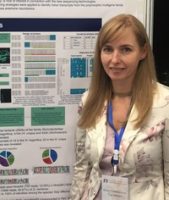Author Interviews, COVID -19 Coronavirus, Environmental Risks / 01.11.2023
Face-to-Face: Study Finds Peak Viral Transmission Occurs Within 5 Seconds
MedicalResearch.com Interview with:
Prof. Takeshi Asai
Faculty of Health and Sports Sciences, University of Tsukuba,
Tsukuba Japan
Faculty of Physical Education, International Pacific University
Okayama, Japan
MedicalResearch.com: What is the background for this study?
Response: In the early stages of the COVID-19 pandemic, contact and droplet transmission were considered the main routes of infection. However, it was later demonstrated that airborne transmission is an important route. Therefore, accumulating real-world data on airborne transmission was deemed crucial.
(more…)




 Benjamin E. Gewurz MD, PhD
Broad Institute of MIT and Harvard, Cambridge,
Division of Infectious Disease, Department of Medicine, Brigham and Women’s Hospital,
Department of Microbiology, Harvard Medical School
Boston, MA
MedicalResearch.com: What is the background for this study?
Response: When the Covid-19 virus infects cells, it takes over and redirects our cells resources towards the projection of virus building blocks and new viruses. Building blocks include large amounts of RNAs that encode for the viral proteins, much as the mRNA vaccines direct our bodies to make the spike protein. We wondered how the virus changes cell metabolism in order to support the synthesis of vast amounts of viral RNAs within hours of infection.
Benjamin E. Gewurz MD, PhD
Broad Institute of MIT and Harvard, Cambridge,
Division of Infectious Disease, Department of Medicine, Brigham and Women’s Hospital,
Department of Microbiology, Harvard Medical School
Boston, MA
MedicalResearch.com: What is the background for this study?
Response: When the Covid-19 virus infects cells, it takes over and redirects our cells resources towards the projection of virus building blocks and new viruses. Building blocks include large amounts of RNAs that encode for the viral proteins, much as the mRNA vaccines direct our bodies to make the spike protein. We wondered how the virus changes cell metabolism in order to support the synthesis of vast amounts of viral RNAs within hours of infection.


